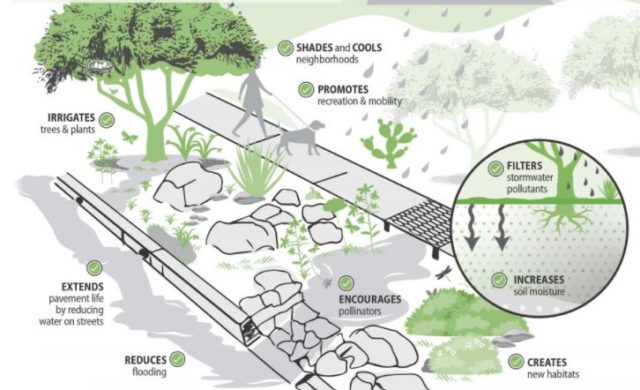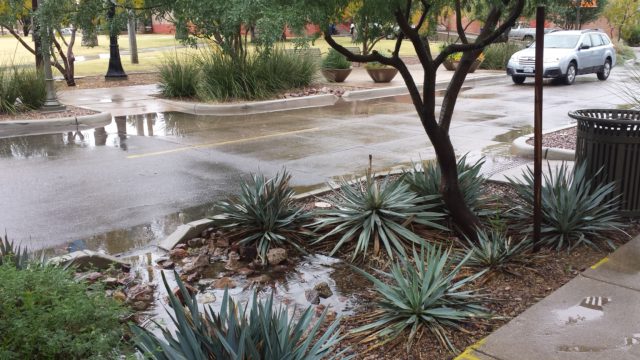Baldwin pilots new program that saves water, improves parks, and addresses climate inequities

The woman-led team at the Green Stormwater Infrastructure program at City of Tucson – Tucson Water is getting ready to tackle some big sustainability issues. Blue Baldwin, program manager, has been awarded a Growing Water Smart technical assistance grant by Planet Women, Sonoran Institute, and the Babbitt Center for Land and Water Policy. We are excited to support Blue and her team as they work to promote water conservation, improve soil health, add shade trees, and reduce flooding in a particularly hot and sunny Tucson neighborhood.
Recently Blue learned that the City of Tucson Parks and Recreation Department was going to redesign an 11-acre park, she leapt at the chance to include green stormwater infrastructure (GSI) techniques in the design. Blue says, “CSM Martin R. ‘Gunny’ Barreras Memorial Park is in a part of Tucson with tree equity scores* that are among the highest priority for investment.” In a desert community like Tucson, shade can make the air feel 10 to 15 degrees Fahrenheit cooler! Blue anticipates that with her input, the new park design will include 35 new trees and more native Sonoran Desert plants.

Even in such a sunny area, it is common to see stormwater flood neighborhood streets during large storms. In downpours, walking and driving can become hazardous. GSI projects are great solutions because they ensure that stormwater flows into water harvesting basins planted with native trees and plants instead. GSI investments can also save water because stormwater is used in place of traditional irrigation. The extra water supports trees and vegetation that create shade, cools the environment, and provides habitat for native species. Thus, GSI promotes climate resilience in heat-stressed communities.

Not only will GSI increase canopy cover, but Blue is implementing a new-to-Tucson method** of improving soil health by adding biologically rich compost and other organic soil amendments that have been tested to meet the park’s needs. By adding organic matter, the soil in the park will be able to absorb more water. According to the USDA, every acre of soil can hold an additional 20,000 gallons of water for every 1% increase in organic matter. This means the soil in the parks will absorb more water, sustaining trees and other plants while reducing flood risks nearby. As a result, the trees and grass will be healthier and will require less water for irrigation, plus the soil health pilot program will cost 25% less than traditional approaches!
By piloting this soil amendment technique at CSM Gunny-Barerras Park, the program hopes to eventually make it a standard procedure across the City of Tucson. By reducing the amount of water needed in public outdoor spaces, Tucson is furthering its Growing Water Smart goals: sound water management practices and support for the green infrastructure program. We’re eager to see what Blue Baldwin, a leader in resilience and conservation, accomplishes next.

One of our partners in this endeavor is Planet Women. Planet Women is a nonprofit that supports women-led solutions to the environmental crisis in Africa, the Amazon, and the U.S. Desert Southwest. “The Colorado River basin is such an important area for habitat protection and drought resilience in the face of climate change,” says Joanna Marshall, Planet Women’s director of development & marketing. “We are thrilled to support Blue and her team as they pursue innovative solutions to protecting communities and helping nature thrive. And we’re so grateful to Sonoran Institute and the Babbitt Center for Land and Water Policy for their partnership in this effort.”
*The Tucson Water green stormwater infrastructure program uses tree equity scores to prioritize investment in GSI in communities where it is most needed. The scores are generated by a data-driven assessment of tree canopy, heat vulnerability, flood vulnerability, and socio-demographic indices.
**The consulting company, WEST Consultants, pioneered the method.
Growing Water Smart is a joint program of Sonoran Institute and the Babbitt Center for Land and Water Policy, a center of the Lincoln Institute of Land Policy.
Blog post by Amanda Smith, manager, Growing Water Smart.
